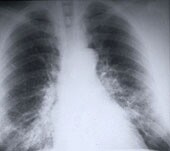
TUESDAY, Sept. 28 (HealthDay News) — Despite previous findings to the contrary, new research indicates that black patients with non-small cell lung are as likely to harbor a specific mutation in tumors as white patients.
This means that black patients should be at least as likely as white patients to benefit from highly effective therapies that target the mutation, such as the drug known as erlotinib, the researchers said.
“This study has immediate implications for patient management,” Ramsi Haddad, director of the Laboratory of Translational Oncogenomics at the Barbara Ann Karmanos Cancer Institute in Detroit, said in a news release from the American Association for Cancer Research.
The mutation involves the epidermal growth factor receptor (EGFR) protein, which is seen in abnormally high numbers on the surface of cancer cells and associated with cancer spread. EGFR mutations increase the tumor’s sensitivity to certain medications designed to shrink tumors and slow progress of the disease, previous research has found.
“Patients with EGFR mutations have a much better prognosis and respond better to erlotinib than those who do not,” explained Haddad, who is also an assistant professor at Wayne State University School of Medicine.
Haddad and his colleagues were scheduled to present their findings Tuesday in Denver at the American Association for Cancer Research International Conference on Molecular Diagnostics in Cancer Therapeutic Development.
The researchers pointed out that black men in particular have a higher than average incidence of lung cancer. In addition, when diagnosed, black patients generally face worse outcomes than white patients. Prior research, the scientists said, suggested that this disparity in prognosis might be driven by a lower occurrence of EGFR mutations among black patients.
The current study team noted, however, that their study is larger than previous trials, having focused on a group of 149 non-small cell lung cancer patients, comprised of 80 white and 69 black participants.
Using high-tech analytical tools, the study authors found no statistically significant difference attributable to ethnicity in the percentage of patients detected as having the relevant mutation.
In addition, the team further observed that black patients may in fact respond better to EGFR mutation-targeting drugs than white patients, given the specific location of black patients’ mutations.
“Thus, African ancestry should not be a factor when deciding whether to test a tumor for these mutations, as doing so could widen the disparity seen in survival,” Haddad said in the news release. “Physicians treating these patients may want to consider this new information in their treatment decisions.”
Like all drugs, erlotinib carries its own set of risks that doctors weigh against the potential benefits. In 2009, the U.S. Food and Drug Administration warned that in rare cases, erlotinib had been linked to serious eye damage and severe, potentially fatal gastrointestinal tract and skin disorders.
More information
For more on non-small cell lung cancer, visit the U.S. National Cancer Institute.

